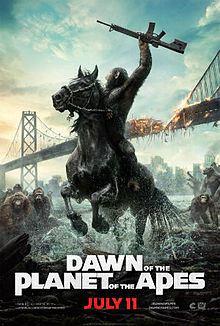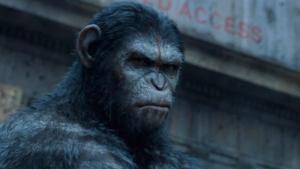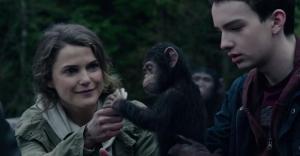
Plot: Ten years after the events of Rise of the Planet of the Apes, the Simian Flu has wiped out most of the planet’s human population. On the outskirts of San Francisco, intelligent chimp Caesar (Andy Serkis) leads a community of apes who live a simple existence. Most of the apes believe that all the humans are gone and that they are relatively safe from harm. In the city of San Francisco itself however, a surviving band of humans, genetically immune to the Simian Flu, have their own community. However, their power supply is running vastly low and the only salvation lies with a hydroelectric dam in the heart of the apes’ community. When these two groups collide fear and misunderstanding quickly escalates to violence on both sides. With apes pitted against humans the conflict becomes a quest for survival.
Review: Riveting, poignant, and compelling, Dawn of the Planet of the Apes is a masterful piece of filmmaking from start to finish. With a phenomenal acting performance by motion capture genius, Andy Serkis, and a slick script by Mark Bomback, Dawn even surpasses the excellent 2011 Rise of the Planet of the Apes.
Dawn of the Planet of the Apes is the rare summer blockbuster that proves to be entertaining and possess a heart at the same time. In many ways it’s the polar opposite of explosion fests like Michael Bay’s Transformers: Age of Extinction, which is heavy on special effects but devoid of plot and nuance. Bay could learn a thing or two from director Michael Reeves about character development and storyline.

While the premise itself is seemingly basic (two opposite communities struggling to survive and leery of the other) its story is fleshed out well thanks to the marvelous direction of Reeves and the even better screenplay of Mark Bomback. Caesar is an ape with tremendous responsiblity. A born leader who displays compassion, he’s torn between his devotion to the ape community and his understanding that every human is different. Unfortunately, not all apes share his conviction such as the vicious Koba (Toby Kebbell) whose suffering at the hands of humans while in captivity has forever damaged his perception of them. This conflict, as you might imagine, plays out with ultimately violent results.
Meanwhile the human community in San Francisco in many ways mimics the apes’ society. These are survivors who are looking to re-establish society but are inherently fearful of the ape community. Some citizens such as Carver (Kirk Acevedo) blame the apes for the Simian Flu. As misguided as this is (the flu was man-made in a lab) Carver has to have someone to blame. Jason Clarke plays Malcolm, a human focused on restoring his community’s power supply. He believes, unlike Dreyfus (played by the excellent Gary Oldman) that a peaceful and diplomatic relationship can be worked out between humans and apes. Malcolm’s relationship with Caesar, while strained at times, develops into an indelible friendship that makes a scene between the two at the end of the film heartbreaking and powerful in its emotional resonance. I’ve truly enjoyed Clarke in previous films like Zero Dark Thirty and Lawless but this may be his best work yet. Kerri Russell has a smaller put poignant and pivotal role as Malcolm’s second wife Ellie, and Kodi Smit-McPhee (The Road) gives another solid performance as Malcolm’s teenage son Alexander.
At it’s heart Dawn is really about one thing: family. Caesar and Malcolm’s individual families serve as a microcosm for each person’s society. Caesar and Malcolm exist for their families and will do anything to protect them. We feel for both groups because really they are not that dissimilar. They both want similar things, yet fear and misunderstandings unfortunately result in devastating events. The dichotomy serves as a corollary to our society where we often fear people who are “other’ without realizing that we are alike in more ways than we can imagine.

Storyline and message aside, Dawn of the Planet of the Apes is a fantastic visual and technical spectacle. The apes themselves are a CGI marvel to behold, even improving from the CGI in Rise of the Planet of the Apes. The battle between apes and humans in the third act is simply astounding. I dare you to see a difference between actual humans and CGI apes in this film. It’s amazing how far the technology has come in just three years. Serkis meanwhile gives maybe his best performance since Gollum. If this portrayal doesn’t earn him an Academy Award nomination, even in a motion capture role, then nothing will. Kudos are also in order for cinematographer Michael Seresin’s fine work behind the camera. He captures the post apocalyptic streets of San Fransisco and the wooded village of Caesar’s people with equal aplomb. Composer Michael Giacchino also presents a brilliant score that is sometimes rousing and other times understated but never overpowering.
Thankfully, Dawn also avoids the trap of an ignominious ending, with a climax that is both satisfying, cathartic, and teases of more adventures to come. Dawn of the Planet of the Apes is quite simply the best film so far this summer and the best in the series since Charlton Heston slipped on his spacesuit in 1968.
My rating: 10/10
You can follow me on Twitter as Darth Gandalf @cocook1978 and on my Facebook page https://www.facebook.com/flicktasticmovies.

